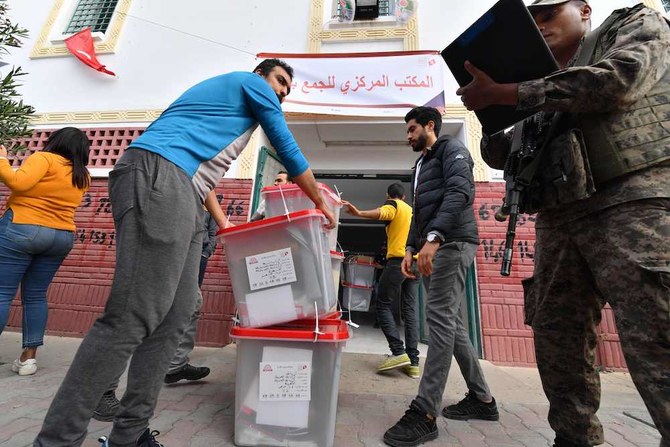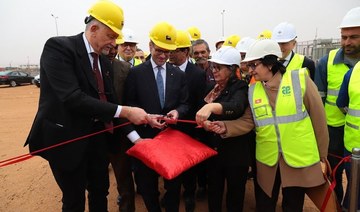TUNIS: Tunisians go to the polls Saturday to elect a parliament largely stripped of its powers, under a hyper-presidential system installed by the head of state Kais Saied after his power grab last year.
Over a decade since Tunisia’s popular revolution unseated dictator Zine El Abidine Ben Ali, opposition parties have urged a boycott of the vote, which they say is part of a “coup” against the only democracy to have emerged from the 2011 Arab Spring uprisings.
The election for the new 161-seat assembly comes after President Saied froze the previous legislature on July 25 last year, following months of political crisis exacerbated by the coronavirus pandemic.
He later dissolved the parliament, which had long been dominated by his nemesis the Islamist-inspired Ennahdha party.
Saied on Wednesday defended his decision, saying that the “Tunisian people, wherever I went, were all asking to dissolve the parliament.”
“The country was on the brink of civil war,” he told US Secretary of State Antony Blinken in Washington.
The previous legislature had far-reaching powers, in the mixed presidential-parliamentary system enshrined in the North African country’s post-revolution constitution.
Last July, Saied used a widely shunned referendum to push through a new constitution, stripping parliament of any real clout and giving his own office almost unlimited powers.
The legal expert who oversaw its drafting said the version Saied published had been changed in a way that could lead to a “dictatorial regime.” Saied later published a slightly amended draft.
Analyst Hamadi Redissi said the aim of Saturday’s polls was “to complete the process that started on July 25” last year.
The resulting parliament “won’t have many powers — it won’t be able to appoint a government or censure it, except under draconian conditions that are almost impossible to meet.”
Saied’s new system essentially does away with political parties and electoral lists, meaning candidates will be elected as individuals with no declared affiliation.
He appoints the prime minister under the new constitution — a departure from the previous system which gave parliament a central role in picking the cabinet.
The assembly’s final make-up is not expected to be determined until March next year, after any second-round run-offs have been completed.
The vote aims “to increase the legitimacy of the presidency,” Redissi said, adding that the result would be “a rump parliament without any powers.”
Almost all the country’s political parties, including Ennahdha, have said they will boycott the vote, labelling Saied’s moves a “coup.”
The head of the National Salvation Front, the main opposition alliance which includes Ennahdha, said the bloc would not recognize the results.
The elections “will plunge the country even further into political crisis,” Ahmed Nejib Chebbi told journalists in Tunis on Thursday.
He also voiced alarm over the postponement of a critical International Monetary Fund meeting next Monday, at which the Washington-based lender was to decide on a bailout package for the deeply indebted North African country.
The delay “threatens the country’s economic balance,” he said.
The powerful UGTT trade union federation, which did not openly oppose the initial power grab, has called the poll meaningless.
Most of the 1,058 candidates are unknowns.
The Tunisian Observatory for Democratic Transition says some 26 percent are teachers, and a further 22 are mid-level public servants.
The election result will likely see a drop in the representation of women, with just 122 female candidates.
Nejib Chebbi, head of an anti-Saied coalition including Ennahda, said the election amounted to a “a still-born farce,” and the result seems unlikely to have any impact on government policy.
Al Bawsala, a non-governmental organization that has monitored the work of parliament, has said it will boycott the new legislature which it believes will be an instrument for the president.
Few of the country’s nine million registered voters are expected to turn out.
Several young people told AFP they had little interest in the election or desire to know more about the candidates.
Marwa Ben Miled, a 53-year-old shopkeeper, told AFP the country was “going from bad to worse.”
“What happens on the political scene doesn’t interest me anymore,” she said. “I don’t trust anyone.”
Tunis construction worker Mohamed Salmi said he did not plan to vote. “They have made our lives hell ... Our ultimate dream has become to find a bottle of milk for our children,” he told Reuters.
Saied’s electoral law forbids candidates from speaking to the foreign press, a stance the North Africa Foreign Correspondents’ Club said would make it difficult for journalists to do their jobs.
Saied has made several public appearances, meeting market traders in the Old City of Tunis in the run-up to the vote.
Some social media users have posted satirical images ridiculing the vote.
In one video, a mock candidate appears with a cigar and smelling a posy of jasmine, before giving a donation to a pair of musicians who then shout pro-Saied slogans.
(With AFP and Reuters)
Tunisian election to entrench president’s rule
Short Url
https://arab.news/wkk72
Tunisian election to entrench president’s rule

- Tunisia holds a parliamentary election on Saturday that will tighten President Kais Saied's grip on power
- The ballot bolsters a new political order following Saied's dissolution last year of the previous legislature













